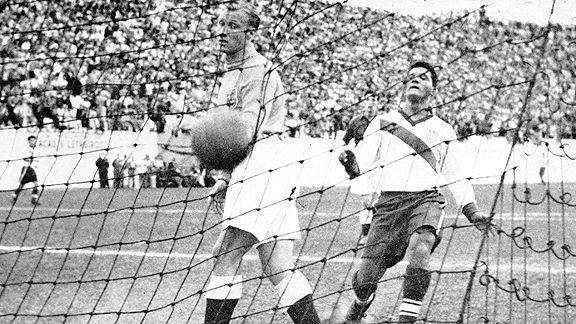 In his Priceonomics essay, “Why Are Some Countries Good at Soccer?” Alex Mayyasi lays out some of the reasons why the U.S. doesn’t have a pretty record at the beautiful game without touching on the most obvious one: Our best athletes lack financial incentive to commit to the sport. Imagine our team if Lebron James and Billy Hamilton and Calvin Johnson played only soccer from when they were young. That’s what would happen if they were raised in countries where that sport is king, but it’s not the case in America, where more immediate monetary rewards come from other athletics. While a soccer salary in Europe can be stratospheric, there’s a lot of distance a talented American youth athlete would have to travel, figuratively as well as literally, to secure one. Their odds for winning the lottery are better if they concentrate on sports that are popular domestically. From Mayyasi:
In his Priceonomics essay, “Why Are Some Countries Good at Soccer?” Alex Mayyasi lays out some of the reasons why the U.S. doesn’t have a pretty record at the beautiful game without touching on the most obvious one: Our best athletes lack financial incentive to commit to the sport. Imagine our team if Lebron James and Billy Hamilton and Calvin Johnson played only soccer from when they were young. That’s what would happen if they were raised in countries where that sport is king, but it’s not the case in America, where more immediate monetary rewards come from other athletics. While a soccer salary in Europe can be stratospheric, there’s a lot of distance a talented American youth athlete would have to travel, figuratively as well as literally, to secure one. Their odds for winning the lottery are better if they concentrate on sports that are popular domestically. From Mayyasi:
“Current U.S. head coach Jurgen Klinsmann has cited the lack of soccer culture in the United States as an obstacle, saying that ‘One thing is certain: The American kids need hundreds and even thousands more hours to play.’ FiveThirtyEight recently reviewed the work of Stefan Szymanski, author of Soccernomics, which found that the best predictor of a country’s success in the World Cup is the number of games the national team had played. According to Szymanski, this means the U.S. men’s national team not only has less experience, but it has missed out on adapting strategy from the rest of the world by playing significantly fewer games — the U.S. is still catching up from missing the World Cup from 1950 to 1990.
After all, the thesis of the 10,000 hour rule, as debated by psychologists, is not merely that masters need lots of practice, but that the type of practice matters. Klinsmann, the U.S. head coach, has placed on recruiting Americans who play in European leagues and face ‘the best competition in the world on a daily basis instead of only a few games every few years,’ as is the case for MLS players on the World Cup team.
Similarly, aspects of the U.S. youth soccer system seems to keep young players from engaging in ‘deliberate practice’ as much as their peers elsewhere. In America, young players compete in dozens and even hundreds of games every year — games that crowd out time that European youths spend practicing skills and fundamentals. ‘It’s counterproductive to learning,’ John Hackworth, the former under-17 national team coach, tells the New York Times, ‘and the No. 1 worst thing we do.’ And while foreign teams prioritize development by giving star players extra attention and allowing them to play with older and better players, the American focus on winning and the team keeps youth soccer in America from shaping future stars of the national team.”
